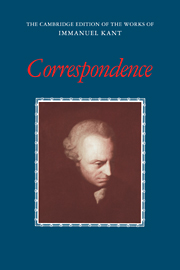Book contents
- Frontmatter
- Contents
- General Editors' Preface
- Acknowledgments
- Introduction
- Letters before 1770
- 1749
- 1759
- 1762
- 1763
- 1765
- 1766
- 1768
- 1769
- Letters 1770–1780
- Letters 1781–1789
- Letters 1790–1794
- Letters 1795–1800
- Public Declaration concerning Fichte's Wissenschaftslehre, August 7, 1799
- Biographical Sketches
- Glossary
- Index of Persons
1763
from Letters before 1770
Published online by Cambridge University Press: 07 September 2010
- Frontmatter
- Contents
- General Editors' Preface
- Acknowledgments
- Introduction
- Letters before 1770
- 1749
- 1759
- 1762
- 1763
- 1765
- 1766
- 1768
- 1769
- Letters 1770–1780
- Letters 1781–1789
- Letters 1790–1794
- Letters 1795–1800
- Public Declaration concerning Fichte's Wissenschaftslehre, August 7, 1799
- Biographical Sketches
- Glossary
- Index of Persons
Summary
I have had the pleasure of discovering by way of the Berlin newspaper that my essay, with the motto “Verum animo satis haec, etc”. from Lucretius, an essay that was delivered to you, dear sir, by the merchant Abraham Gottlieb Ficker and a receipt for which, signed by you, sir, and dated Berlin, 31 October, 1762, was transmitted to me, was pronounced worthy of Second Place after the winning Prize Essay by the Royal Academy of Sciences assembly.
I am all the more moved by this favorable judgment in view of how little care in preparing its appearance and ornamentation went into the work, since a somewhat too lengthy delay left me with hardly enough time to present some of the most important arguments on this subject on which I have been reflecting for several years and the goal of which reflections, I flatter myself, I am near to reaching.
I take the liberty of inquiring, dear sir, whether my work will be published by the Academy along with the winning Prize Essay and whether in that case the inclusion of a supplement containing considerable elaboration and a more precise explication might be acceptable to your excellent society. Leaving aside any motive of vanity, publication seems to me to be the best means of encouraging scholars to inspect a method from which alone, I am convinced, a happy outcome for abstract philosophy can be awaited, if that inspection be supported to some extent by the authority of a highly esteemed learned society.
- Type
- Chapter
- Information
- Correspondence , pp. 69 - 76Publisher: Cambridge University PressPrint publication year: 1999

